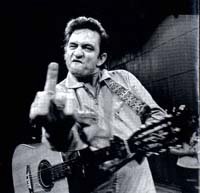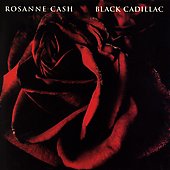 Walk the Line
Walk the LineCatfish / Fox 2000 Pictures / Tree/Line Film
James Mangold, Director
2005
James Mangold's Walk the Line tells the life story of Country Music's first family after the Carters, Johnny Cash (Joaquin Phoenix) and June Carter (Reese Witherspoon). The film is structured, as well as the life it depicts, very much in the same manner as Ray. Mangold uses the same tried and true directorial methods Taylor Hackford employed in the Ray Charles biopic. Flashback is used liberally and in a more effectively than in Ray. Walk the Line is set against the backdrop of January 13, 1968. The Summer of Love was a year over and the '68 Democratic National Convention was still months off. Cash, against the desire of Columbia Records executives, is recording a live concert at Folsom State Prison, Represa, California. The flashback is an extended one, beginning with Cash preparing to mount the stage at his mythic Folsom Prison Concert. The concert flashback dramatically holds the film together.
Like Ray, the film addresses Cash's dirt poor childhood, a horrible accident that results in his older brother's death (for which Cash feels responsible, sounds familiar see Music: Americana and Her Musical Legacy – Ray Charles and Jamie Foxx) and initiates a strained get along with his sharecropper father (Robert Patrick) and contributes to Cash's future amphetamine and barbiturate addiction (sound familiar, again? Music: Americana and Her Musical Legacy – Ray Charles and Jamie Foxx). Cash joins the Air Force to leave his crumbling home and begins to write songs. Once discharged Cash marries the woman who will be the mother Rosanne Cash (and several other children), Vivian Liberto (Ginnifer Goodwin) in 1954 and moved to Memphis, Tennessee, where he sold home appliances while studying to be a radio announcer and disc jockey. Those were his day jobs.
In the evenings, Cash joined forces with guitarist Luther Perkins (Dan John Miller) and bassist Marshall Grant (Larry Bagby), who were collectively known as the Tennessee Two. Cash approached Sam Phillips (Dallas Roberts) at Sun Records studio, hoping to land a recording contract. After an audition of mostly gospel songs, Phillips suggested that Cash "go home and sin, then come back with a song I can sell." Cash sharpened his early frenetic freight train style and brought "Hey Porter" and "Cry Cry Cry" to Phillips which were subsequently released in 1955 and met with modest critical acclaim (which, today, has greatly inflated, as hindsight often provides).
Now a label-signed musician, Cash settles in to his home life and begins his music career, an immiscible mixture when considering his new wife, who has trouble adjusting to Cash’s irregular lifestyle. And what an irregular lifestyle it was. John R. Cash, a sharecropper’s son soon finds himself on tour young soon to be legends including Elvis Presley (Tyler Hilton) and Jerry Lee Lewis (Waylon Malloy Payne). On this first tour, Cash is introduced to June Carter (Reese Witherspoon), a daughter of the famous Carter family.
The two have a mutual attraction, though June thwarts any serious attention from Cash. Cash goes on to gain international acclaim while his marriage self destructs and he finds himself chemically dependant. As Sissy Spacek and Beverly D'Angelo did in Coal Miner's Daughter, Phoenix and Witherspoon performed all of their own singing in the movie. In the case of Phoenix propted Perry Seibert, again, of All Movie to write:
...Joaquin Phoenix passes the test that buries most performers who play famous musicians; one never doubts that he is playing a person capable of creating these fantastic songs. That he handles his own singing in the film is simply a bonus. Even if he does not sound exactly like Cash, he is close enough that — when augmented by the film's outstanding editing and the emotional thrust of the story — the illusion is complete.
Where Ray (Music: Americana and Her Musical Legacy – Ray Charles and Jamie Foxx) was a series of vignettes of the artist changing the direction of musical history, Walk the Line approaches its subject from the vantage point of this complex relationship between Johnny Cash and June Carter. Like Ray and Kiss of the Spiderwoman before it, Walk the Line is a performance-fueled affair. The movie is supported by the typical scenes one expects from movies about real-life protagonists, but Walk the Line is hot wired by its two outstanding lead performances. While most criticism cites Witherspoon’s performance superior to Joaquin  Phoenix, Phoenix nevertheless turns in a performance that slays the majority of its competitors.
Phoenix, Phoenix nevertheless turns in a performance that slays the majority of its competitors.
Of refreshing interest is Phoenix depicting the young, brash Cash, the Cash of the famous photograph taken prior to the Folsom Prison Performances, expressing his rebellion with his middle finger. Phoenix depicts the rage and hubris of Cash in early performance that one cannot necessarily read from his live recordings. For her part, Reese Witherspoon sheds the robes of Legally Blonde producing a white-hot performance depicting every mixed feeling of an astute legend forced to play second fiddle.
Walk the Line captures life, the joy, the difficulty, the loss, and the sublime. Johnny and June Cash are modern versions of Odysseus and Penelope. As for the man, perhaps Johnny Cash is best captured in the Kris Kristofferson song, “The Pilgrim, Chapter 33:”
He’s a poet, he’s a picker--
He’s a prophet, he’s a pusher--
He’s a pilgrim and a preacher, and a problem when he’s stoned--
He’s a walkin’ contradiction, partly truth and partly fiction,
Takin’ ev’ry wrong direction on his lonely way back home.
Only Johnny Cash didn't take every wrong direction and was not lonely on his way back home. Part V: The Legend of Johnny Cash, Johnny Cash
Part V: The Legend of Johnny Cash, Johnny Cash
Hip-O Records 000528802, 2005
ASIN: B000BISBDY
Released October 25, 2005
Finally, all on a single disc.
Johnny Cash’s discography is a mess, particularly “greatest hits" compilations. The Legend of Johnny Cash offers the best single disc compilation available spanning Cash's entire career. Through the magic of contracts and legal intercourse, songs from different labels are brought together on a single disc, specifically Sun Entertainment Corporation, Sony-BMG Music Entertainment, the Island Def Jam Music Group, and American Recordings. The selections are worth listing:
1. Cry! Cry! Cry! (Sun Records)
2. Hey Porter (Sun Records)
3. Folsom Prison Blues (Sun Records)
4. I Walk The Line (Sun Records)
5. Get Rhythm (Sun Records)
6. Big River (Sun Records)
7. Guess Things Happen That Way (Sun Records)
8. Ring Of Fire (Columbia/Sony Records)
9. Jackson - (with June Carter) (Columbia/Sony Records)
10. A Boy Named Sue - (live) (Columbia/Sony Records)
11. Sunday Morning Coming Down (Columbia/Sony Records)
12. Man In Black (Columbia/Sony Records)
13. One Piece At A Time (Columbia/Sony Records)
14. Highwayman (Columbia/Sony Records)
15. The Wanderer (with U2) (Def Jam Records)
16. Delia's Gone (American Recordings)
17. Rusty Cage (American Recordings)
18. I've Been Everywhere (American Recordings)
19. Give My Love To Rose (American Recordings)
20. The Man Comes Around (early take) (American Recordings)
21. Hurt (American Recordings)
Compressing a 50 year musical career into a single 80-minute compact disc is disingenuous, but for a music novice looking for an inexpensive primer, The Legend of Johnny Cash is all one needs as a starting Point.
A summation of this list is really pretty easy, The Sun Material is indispensable. Should the listener like this, he or she should seek out Walking the Line: The Legendary Sun Recordings (Metro-Music, METRTCD805, 2005). For the money, this three disc set cannot be beat.
The Columbia/Sony Material is exceptional through “Sunday Morning Coming Down.” Should these songs appeal to the listener, it is required of the listener to purchase Johnny Cash at Folsom Prison (Sony, 65955, 2000), Johnny Cash at San Quentin (Sony, 66017, 2000) and Johnny Cash at Madison Square Garden (Sony, 86808, 2002). There is a bona fide slice of Americana.
I always considered “The Man in Black,” “One Piece at a Time,” and “Highwayman” novelty tunes (not that “A Boy Named Sue” was not one), but this is not the best Cash period, it is the 1970s and ‘80s, before the artist rediscovered himself and began his long goodbye.
The Johnny Cash American Recordings are a monument. The very late recordings, when Cash was gravely ill are difficult to listen to but should the listener like any of this period, but American Recordings (American Recordings, 586790, 1994). This is essential music.
. Black Cadillac, Rosanne Cash
Black Cadillac, Rosanne Cash
Capitol Records 48738, 2006
ASIN: B000CETWOY
Released January 24, 2006
Her Father's Daughter.
Rosanne Cash arises from the ashes of the deaths her three parents within one year and produces her masterpiece. Those expecting a Rosanne Cash from her Rodney Crowell and post-Rodney Crowell periods will be disappointed. While the production of Black Cadillac is sleek and shiny as chrome, beneath the surface lays an anxious emersion from the sleep of grief. Within the span of this single disc the listener can hear Rosanne Cash pass through the five phases of loss: denial, anger, bargaining, depression, and finally, acceptance.Written between the Springs of 2003 and 2005, Black Cadillac is catharsis by deep loss. Miss Cash captures in 13 compositions the cosmic concepts of Lieben Sie und Tod , love and death.
The opening composition and title cut opens with at; it is a reckoning, with memory, anger, love, joy, grief, pain, and resolve. The set opens with a recording of her father calling her, his voice distant: "Rosanne, c'mon." a nervous muffled bass, recalling “Riders on the Storm,” trap set, and guitars emerging as if from anesthesia, enveloping Miss Cash’s voice:
It was a black Cadillac/That drove you away...Now one of us gets to go to heaven/While one has to stay here in hell.
The song explodes into a deluge:
It was a black Cadillac/Like the one you used to drive/You were always rollin'/But the wheels burnt up your life/It's a black heart of pain I'm wearin'/That suits me just fine/'Cause there was nothin' I could do for you/While you were still alive.
With a background of electric guitars, a whirling Fender Rhodes, and the distant brass quoting "Ring of Fire," makes up a preludial microcosm of the reminder of the disc. Miss Cash is direct in expressing, regret, anger, remorse and finally love. "Burn This Town Down" is rageful with no and everything as a target. "I Was Watching You" is about the lifetime of a 50 year relationship compressed into four minutes. This is life reaching critical mass: "Long after life/There is love."
Faith and spirituality are a flowing undercurrent throughout the recording, expressing themselves on "God Is in the Roses" and "Like Fugitives." Like her father, Faith is a continuing proposition taken and not taken seriously, just like real life for anyone.
Black Cadillac is one of those rare recordings that belong to everyone. Loss is inevitable and everyone experiences it. What everyone does not do is turn that loss into high art as Rosanne Cash has. Black Cadillac is Homeric wisdom and experience in the extreme: the vision of a goddess fallen to earth.
© Copyright, C. Michael Bailey, 2006
